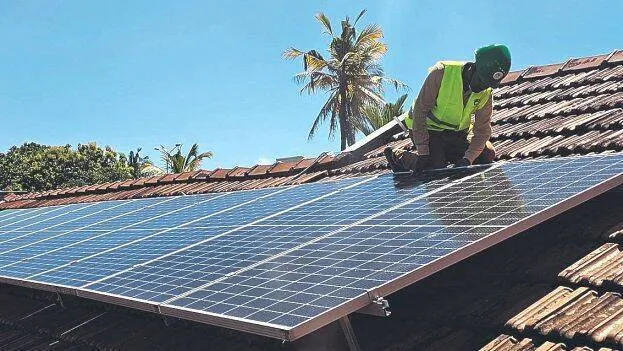

It has already been proven how beneficial solar power is for states like Kerala that face electricity shortages. The advantages gained by reducing conventional electricity usage are also significant. Solar energy plays a crucial role in reducing carbon pollution. Additionally, the cost of producing solar energy is relatively low. For instance, the Cochin International Airport has been operating entirely on solar power for the past several years. The electricity generated there not only meets the airport's needs but is also supplied externally. Considering this remarkable achievement in the solar sector, even the United Nations has recognized the Cochin Airport with prestigious awards.
The reason for mentioning this now is a news report that the Travancore Devaswom Board is planning to implement solar power projects at Sannidhanam, Pamba, and Nilakkal with technical assistance from the Cochin International Airport. The board currently spends ₹15 crores annually to meet the electricity demands of Sabarimala and its associated facilities. This expense has been steadily increasing every year. With the implementation of the Sabarimala Master Plan, electricity consumption and related expenses are expected to rise significantly. Transitioning to solar power can save the board a substantial amount of money. The only challenge is finding the initial capital investment. Once implemented, recurring expenses will be eliminated.
Apart from Sabarimala, there are plans to install solar power plants in 26 other major temples under the Devaswom Board. As a first step, the plants will be established at Sannidhanam, Pamba, and other key locations. Preliminary discussions between CIAL (Cochin International Airport Limited) officials and Devaswom Board representatives have already taken place. CIAL will soon hand over a detailed project report to the Devaswom Board. Once the report is received, the next steps can be initiated promptly. The Devaswom Board may also receive financial assistance from banks to implement the solar project. The expansive open areas like the Sannidhanam's vast nadapanthal and the Annadanam Mandapam provide ideal locations for installing solar panels. There are other locations as well that receive uninterrupted sunlight. Similarly, sufficient space is available at Pamba and Nilakkal for installing solar panels.
Many of the large temples where the project is intended to be implemented also have ample space required for installing solar panels. Along with installing solar plants, it is essential to ensure their proper maintenance without any negligence. Only then can the project be successful. In the context of the electricity crisis faced by the state, there is a pressing need for initiatives to maximize reliance on solar energy. Currently, numerous institutions are dependent on solar power, including many colleges and hospitals. However, government offices are the only ones hesitant to adopt it. Since the government pays the electricity bills for these offices, no one seems to consider it seriously. If the Devaswom Board's transition to solar power inspires other Devaswom Boards and major temples in the state to follow suit, it could lead to a revolution in the energy sector.